The prime ministers of the Czech Republic, Poland and Slovenia arrived in Kyiv yesterday in a show of high-level backing for Ukrainian President Volodymyr Zelensky, who briefed them on the war with Russia.
The three, who came by train, were the first foreign leaders to visit the capital since Russia invaded last month.
"Your visit to Kyiv at this difficult time for Ukraine is a strong sign of support. We really appreciate it," Mr Zelensky said in an online post.
Brief footage released by his office showed him speaking in Ukrainian and English to Polish Prime Minister Mateusz Morawiecki, Czech counterpart Petr Fiala and Slovenia's Janez Jansa, who were also due to meet Ukrainian officials.
Also in attendance was Polish Deputy Prime Minister Jaroslaw Kaczynski, leader of the country's ruling PiS party, who is seen as the main decision-maker in the country.
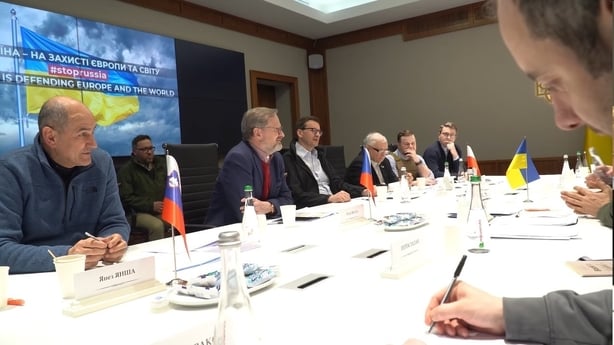
Russian air strikes and shelling hit Kyiv yesterday killing at least four people, authorities said, as invading forces tightened their grip and the mayor announced a 35-hour curfew.
"It is here, in war-torn Kyiv, that history is being made. It is here, that freedom fights against the world of tyranny. It is here that the future of us all hangs in the balance," Mr Morawiecki wrote on Twitter.
The Czech Republic and Poland, former communist members of both the EU and NATO, have been among the strongest backers of Ukraine in Europe since the Russian invasion.
Ukrainian Prime Minister Denys Shmygal hailed what he said was the "courage of true friends" and said the leaders would discuss support for Ukraine and further sanctions.
Polish state-run broadcaster TVP Info reported that Mr Morawiecki and Mr Kaczynski also went to meet the Kyiv authorities.
Mr Fiala said the decision to visit was taken in consultation with European Council President Charles Michel and European Commission President Ursula von der Leyen.
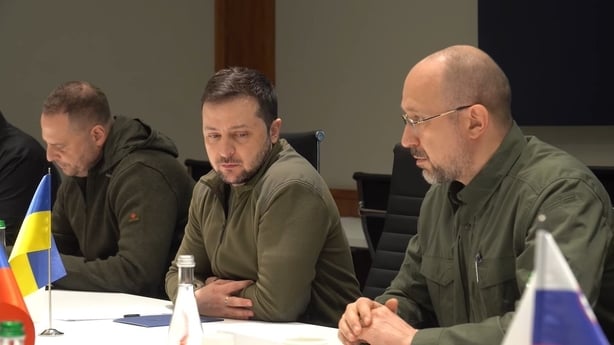
The idea of the trip was agreed at an EU leaders' summit in Versailles in France last week, Mr Dworczyk said.
But an EU official said there was no "formal mandate" extended by Brussels.
"It's a very valid initiative. Every initiative to bring peace back to Ukraine is of course welcome," the official said. "Some leaders might also wonder: will this jeopardise or will this improve conditions for negotiations with the Russians. It remains to be seen, of course. It's a fine line."
Russia calls its actions a "special military operation" to"denazify" Ukraine, which Kyiv and its Western allies reject as a pretext for an unjustified and illegal attack.
Kyiv under fire
Two powerful explosions rocked the capital before dawn yesterday and tracer fire lit up the night sky. A high-rise apartment building was in flames after being struck by artillery.
Firefighters tried to douse the blaze and rescue workers helped evacuate residents trapped inside using mobile ladders.
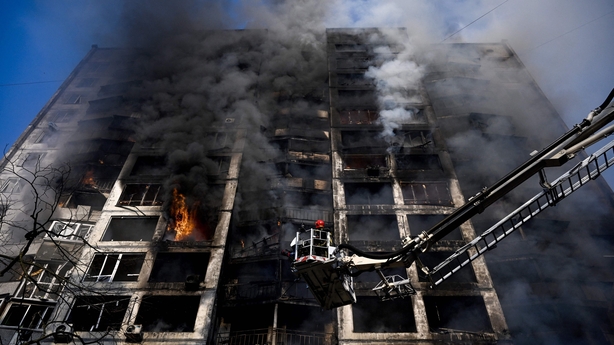
Sitting on the ground outside, resident Igor Krupa said he survived because he had slept under a makeshift shelter of furniture and metal weights: "All the windows went out and all the debris went into the apartment."
But despite shelling that has reduced some cities to rubble, Europe's biggest invasion force since World War II has been halted at the gates of Kyiv, nearly three weeks into a war that Western countries say Moscow believed it would win within days.
Major road and train routes from the capital are still open and Russia has failed to capture any of Ukraine's ten biggest cities.
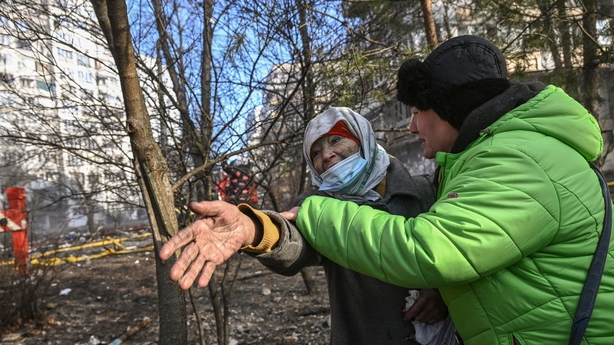
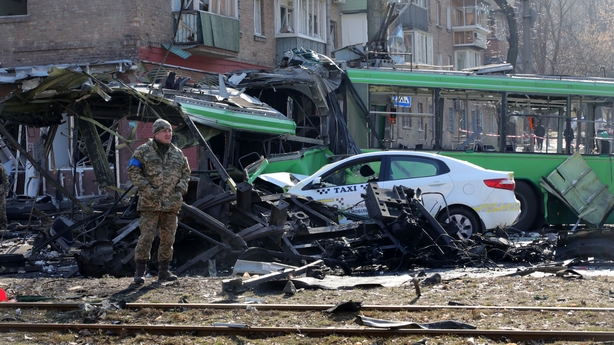
Hosting foreign dignitaries in his own capital would be a remarkable achievement for President Volodymyr Zelensky, who rejected offers to evacuate early in the war, staying under bombardment to rally his nation.
In his most confident public statement yet, Mr Zelensky called on Russian troops to surrender, saying they and their officers already knew that the war was hopeless.
"You will not take anything from Ukraine. You will take lives. There are a lot of you. But your life will also be taken. But why should you die? What for? I know that you want to survive," he said.
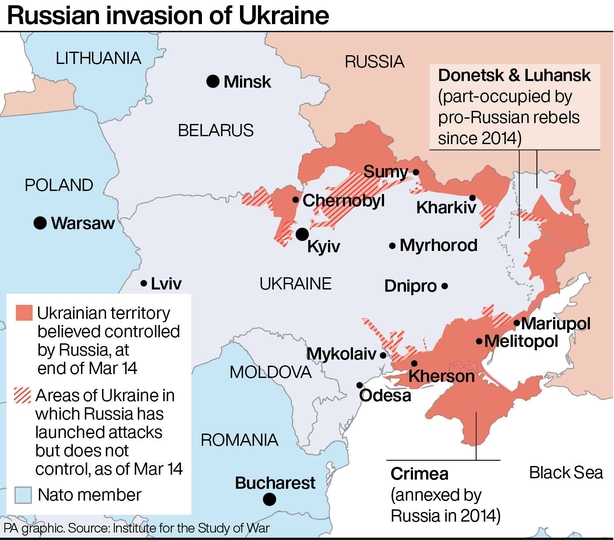
One of Mr Zelensky's top aides said the war would be over by May - and could even end within weeks - as Russia had effectively run out of fresh troops to keep fighting.
"We are at a fork in the road now: there will either be a peace deal struck very quickly, within a week or two, with troop withdrawal and everything, or there will be an attempt to scrape together some, say, Syrians for a round two and, when we grind them too, an agreement by mid-April or late April," Oleksiy Arestovich said in a video.
"I think that no later than in May, early May, we should have a peace agreement, maybe much earlier: we will see," Mr Arestovich said.
The remarks projected a new-found confidence that Ukraine's heavily outnumbered forces have thwarted what Western countries believe was Moscow's aim - to topple Mr Zelensky and install pro-Russian leaders in Kyiv.
Russia says it is not targeting civilians and is carrying out a "special operation" to disarm and "denazify" Ukraine.
We need your consent to load this rte-player contentWe use rte-player to manage extra content that can set cookies on your device and collect data about your activity. Please review their details and accept them to load the content.Manage Preferences
Kremlin spokesperson Dmitry Peskov said it was too early to predict progress at peace talks, due to resume today by video link.
"The work is difficult and in the current situation the very fact that they are continuing is probably positive," he told reporters.
In the city of Rivne in western Ukraine, hundreds of kilometres from the combat zone, Ukrainian officials said 19 people had been killed in a Russian air strike on a television tower. If confirmed, that would be the worst attack so far on a civilian target in Ukraine's northwest.
Peace talks have focused so far on local ceasefires to let civilians evacuate and bring aid to surrounded cities.
Worst-hit is the southeastern port of Mariupol, where hundreds have been killed since Russia laid siege in the war's first week.
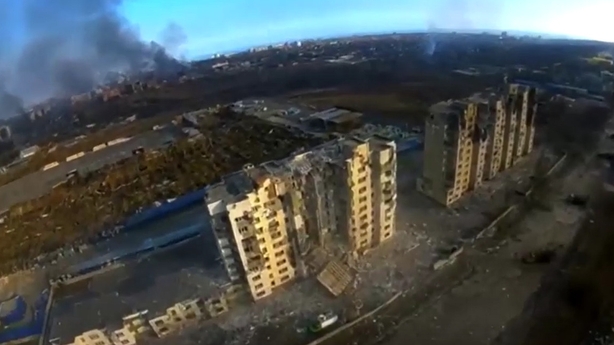
Russian troops let a first column of cars leave Mariupol yesterday, but attempts to bring in aid convoys have failed for ten straight days.
About 300 civilians from Mariupol reached the city of Zaporizhzhia this morning.
At least 200,000 people are in urgent need of evacuation from Mariupol, according to official Ukrainian estimates.
Local authorities in Mariupol say anywhere between 2,300 and 20,000 civilians have died so far in Russian shelling in the city, a toll that could not be independently confirmed.
While Russia has failed to seize any big cities in the north and east, its forces have had more success in the south, where Moscow said it was now in control of the entire region of Kherson.
In an intelligence update, Britain's ministry of defence reported demonstrations against Russian occupation in the southern cities of Kherson, Berdyansk and Melitopol, with troops firing warning shots to disperse crowds in Kherson.
Russian forces were reported to have abducted the mayors of Melitopol and Dniprorudne, it said.
The war has brought economic isolation upon Russia never before visited on such a large economy.
In Russia itself, it has led to a near total crackdown on free speech, with all major independent media shut down and Western social media apps switched off.
A rare anti-war protest occurred in a studio during the main news programme last night on state TV's Channel One, which is the primary source of news for millions of Russians and closely follows the Kremlin line.
A woman held up a sign in English and Russian that said: "NO WAR. Stop the war. Don't believe propaganda. They are lying to you here."
A dissenting employee entered the studio during Russia's most-watched evening news broadcast, holding up a poster saying "No War" and condemning Moscow's military action in Ukraine | Read more: https://t.co/MzHeJM7nkc pic.twitter.com/4RYTMvD9Ez
— RTÉ News (@rtenews) March 15, 2022
She was quickly arrested. Kremlin spokesperson Mr Peskov called her protest "hooliganism".
The United Nations says nearly 3 million people have fled Ukraine since the start of the war.
"I am fleeing with my child because I want my child to stay alive," said Tanya who fled the southern frontline town of Mykolaiv across the Danube river to Romania.
"Because the people that are there now are Russians, Russian soldiers, and they kill children."
Meanwhile, the United States has warned China against providing military or financial help to Moscow.
Moscow denies making any such request, saying it has sufficient resources to fulfil all of its aims, while China has labelled the reports on assistance as "disinformation".
According to US officials, Russia has asked for military and economic support from Beijing, which signalled a willingness to provide aid.
"We have communicated very clearly to Beijing that we won't stand by," State Department spokesperson Ned Price told reporters after US national security adviser Jake Sullivan met China's top diplomat Yang Jiechi in Rome.
"We will not allow any country to compensate Russia for its losses."
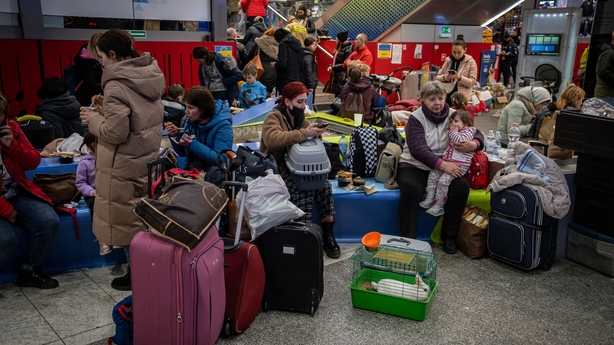
The seven-hour meeting was "intense" and reflected "the gravity of the moment," according to a US official.
Britain's defence ministry said Russia could be planning to use chemical or biological weapons in Ukraine in response to a staged fake attack on Russian troops, without citing evidence. US officials have made similar statements.
Russia has accused Ukraine of planning to use biological weapons. The United Nations on Friday said it had no evidence Kyiv had such a programme.
At the disabled Chernobyl nuclear reactor, power had been restored after damage forced the plant to rely on electricity from diesel generators, Ukraine 24 reported.

